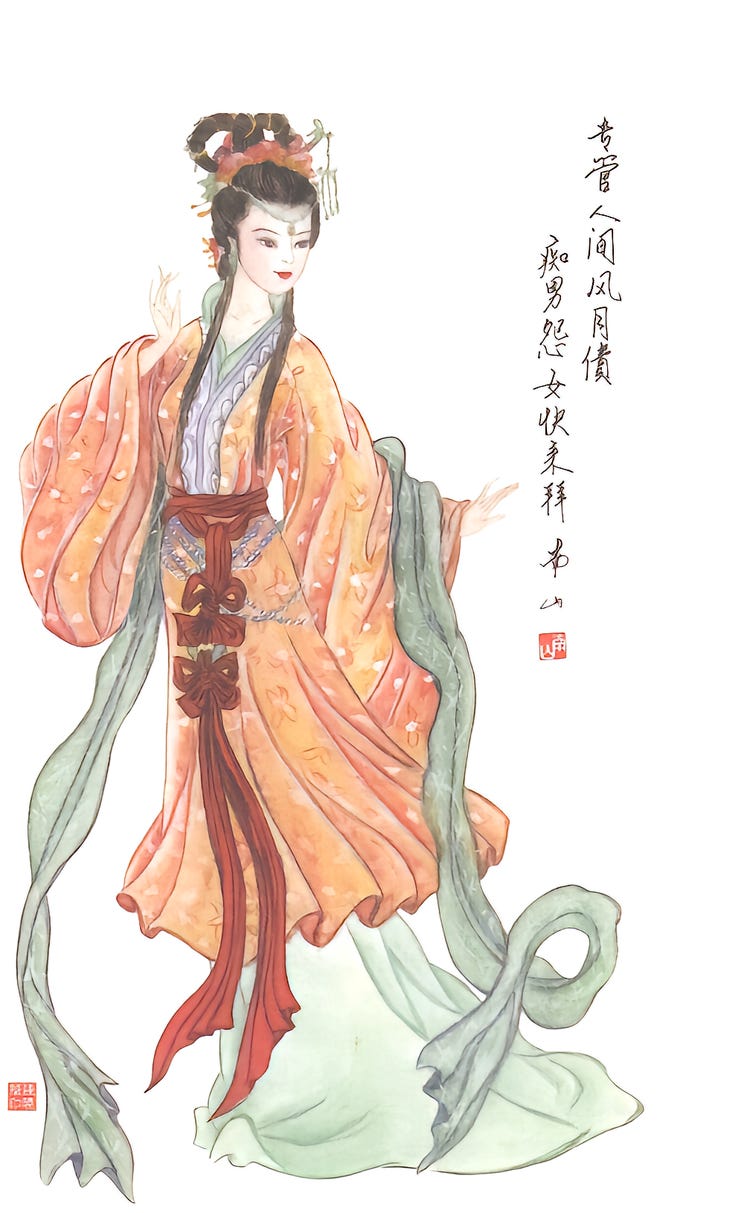Active And Passive Verbs
If you’re reading this blog and you aren’t very familiar with Chinese grammar, today’s post should be pretty interesting to you.
The problem with classical Chinese is that there isn’t any clear cut way to distinguish between the grammatical functions of certain words in sentences. In other words, verbs, adjectives, nouns, and even adverbs are technically all interchangeable. You have to look at the context of the sentence to figure out what grammatical function a certain word has in a certain context.
In yesterday’s translation post, we saw the following two lines:
遠慚西子,近愧王嬙。
From far away, she puts Xi Shi to shame.
Close up, she puts Wang Qiang to shame.
This is a lot harder to translate than it looks.
First of all, 西子 is Xi Shi, the ancient Chinese beauty. 王嬙 is Wang Qiang, another ancient Chinese beauty. It’s clear that the passage here involves some sort of comparison between the goddess being described and both of these famous Chinese beautiful women of the past.
But the hard part are the characters that come right before those names.
慚 (cán) and 愧 (kuì) both mean the same thing. They’re usually thought of adjectives that mean “ashamed” or “embarrassed.” In fact, the modern Chinese word 慚愧 (cánkuì: ashamed, mortified) is what you get when you stick both of them together — and it’s a fairly common word.
The problem here, though, is determining who is 慚 and 愧 in this poem. And that’s where classical Chinese poetry turns into a fun puzzle to solve.
遠 (yuǎn, far away) and 近 (jìn, nearby) are both clearly adverbs. Because you’ve got an adverb, a word, and a noun, the grammatical function of both 慚 and 愧 must be a verb. The problem, though, is that these two sentences have no subject.
I asked DeepSeek’s AI bot for help. It’s interpretation was that the subject must be the speaker. Xi Shi’s beauty puts the speaker to shame, and Wang Qiang’s beauty makes the speaker feel ashamed.
Of course, that can’t be true because it makes no sense in the general context of the poem. You’ve got a long poem filled with all sorts of prose that describes the beauty of this goddess. There’s no reason for the author to suddenly say that he or she feels in awe of the beauty of Xi Shi and Wang Qiang. The subject really needs to be the subject of the poem.
The big question now, though, is whether 慚 and 愧 are active or passive verbs. In other words: does the beautiful goddess cause Xi Shi and Wang Qiang to be put to shame (an active reading), or is the goddess put to shame by Xi Shi and Wang Qiang (a passive reading)?
Honestly, you can read it both ways. Usually classical Chinese will use a particle such as 於 to tell you who the “agent,” or doer, of the passive verb is. So, in this case, if you said 遠慚於西施, the translation would be clear: When seen from a distance, the person is put to shame by Xi Shi.
But the problem here is that we’re dealing with a poem. It’s common in classical Chinese poetry to simply leave things out for the sake of the poem. And that’s why this poem can be interpreted either way.
Both David Hawkes and Gladys Yang decided that 慚 and 愧 are actually active verbs here — that this goddess is so beautiful that she puts the famous Chinese beauties to shame. I agree, and consider it to be the only interpretation that fits in the context.
Keep in mind, however, that it’s actually possible to read this the other way around. And this certainly isn’t the last time we’re going to run into trouble because of the ambiguity of the language.



